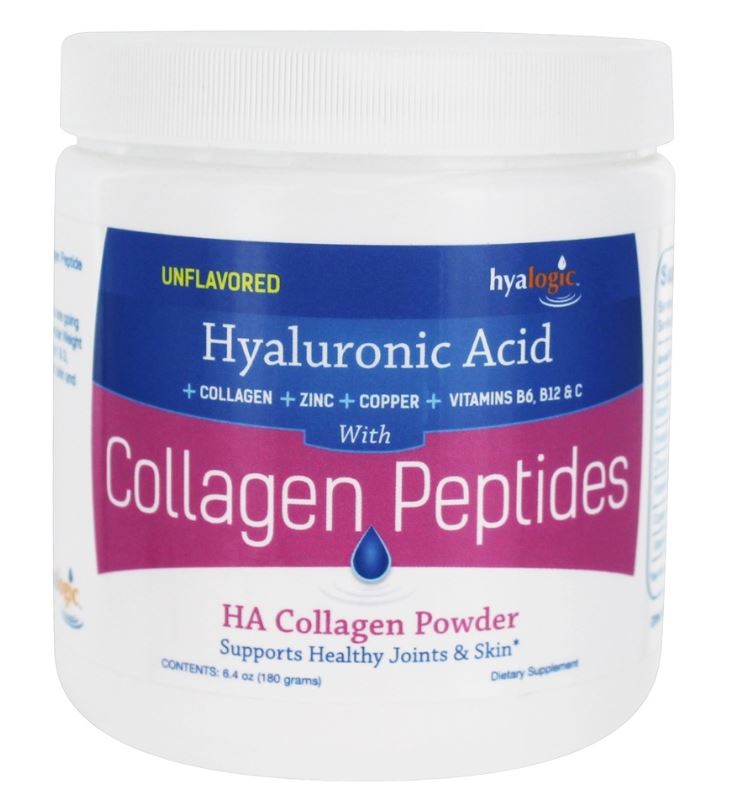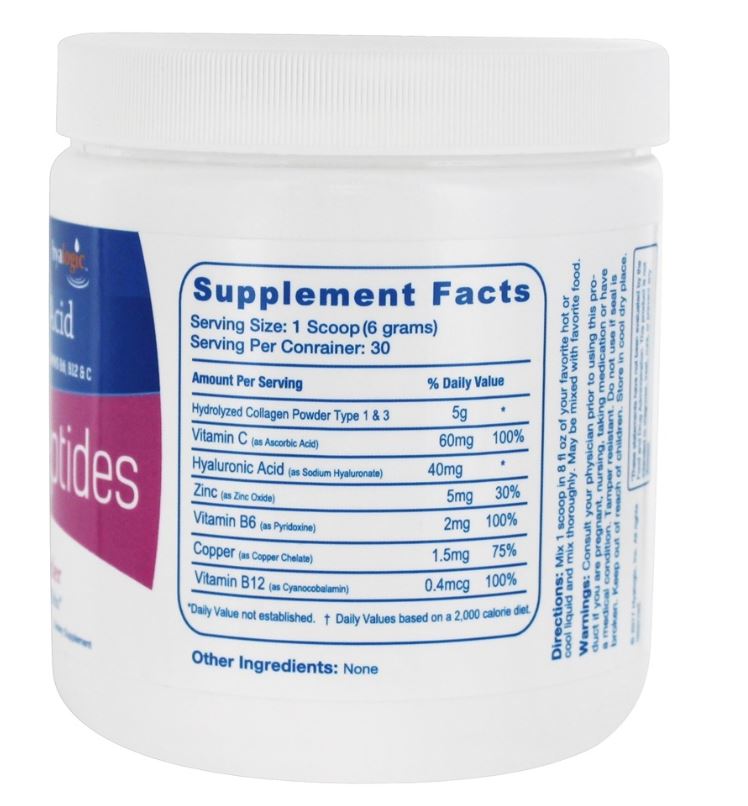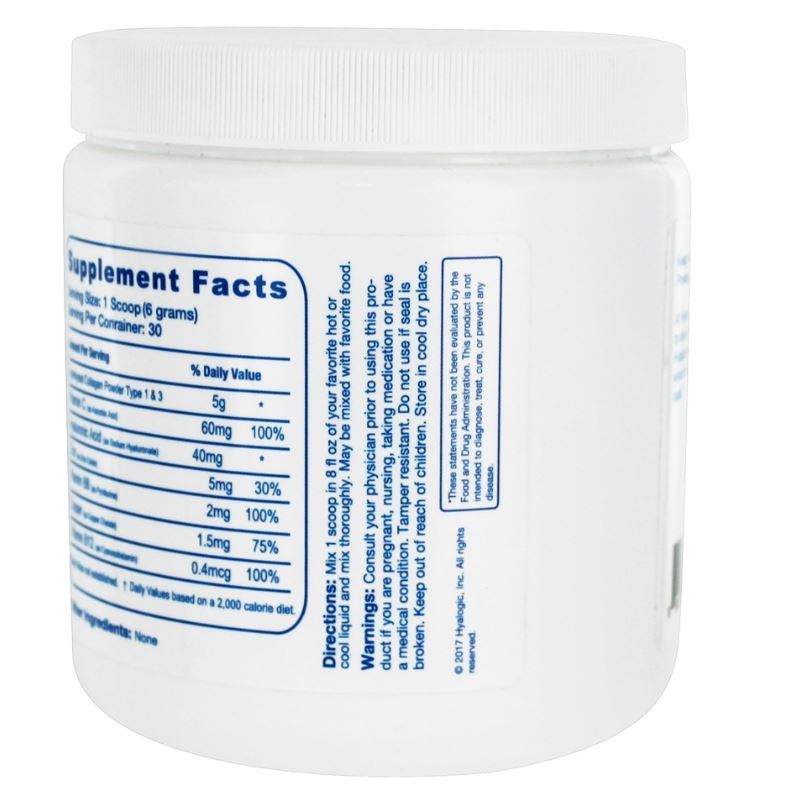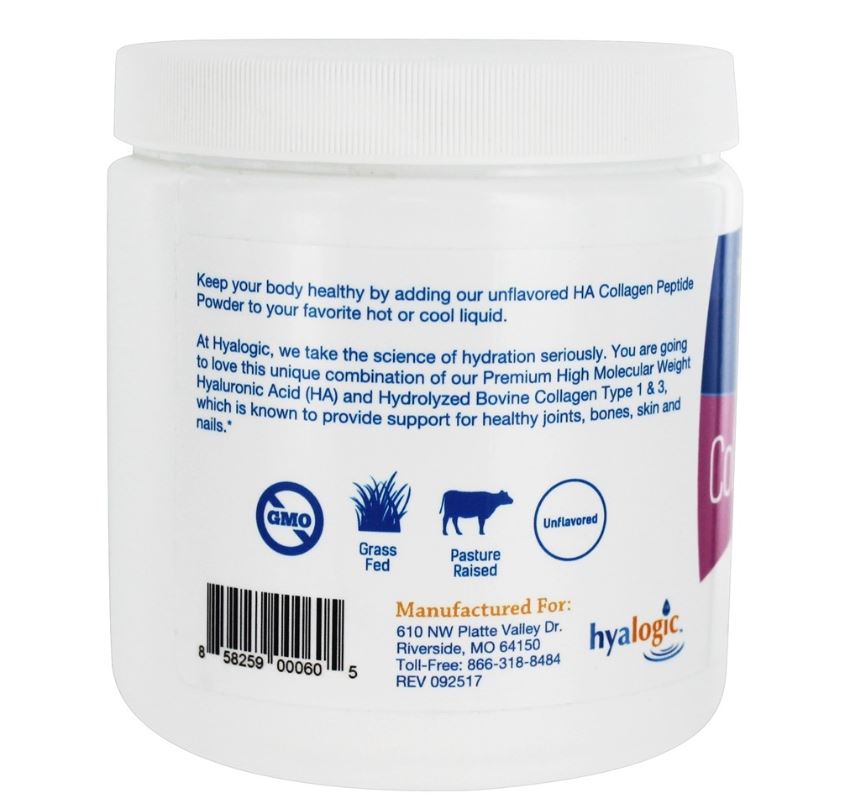Hyaluronic Acid with Collagen Peptides HA Powder Unflavored - 6.4 oz. Hyalogic
Leave a review Ask a question #191076Overview
Description
Hyalogic - Hyaluronic Acid with Collagen Peptides HA Powder Unflavored - 6.4 oz. (180g)
Hyalogic Hyaluronic Acid with Collagen Peptides HA Powder Unflavored keeps your body healthy by supporting joints and skin. This premium high molecular weight Hyaluronic Acid (HA) and hydrolyzed Bovine Collagen (Type 1, 2, 3) is known to provide support for healthy joints, bones, skin & nails.
- Support healthy joints and skin
- Provide collagen, zinc, copper, vitamins B6, B12 & C
- Unflavored
- Non-GMO
- Grass-fed
- Pasture-raised
What is Hyaluronic Acid?
Hyaluronic Acid (HA), also known as hyaluronan or hyaluronate, is a carbohydrate, more specifically a mucopolysaccharide occurring naturally throughout the human body. It can be several thousands of sugars (carbohydrates) long. When not bound to other molecules, it binds to water giving it a stiff viscous quality similar to "Jello". This viscous Gel is one of the most heavily researched substances in medicine today with thousands of trials mostly in the fields of orthopedics and eye surgery. Its function in the body is, amongst other things, to bind water and to lubricate movable parts of the body, such as joints and muscles. Its consistency and tissue-friendliness allows it to be beneficial in skin-care products as an excellent moisturizer. Because HA is one of the most hydrophilic (water-loving) molecules in nature with numerous benefits for the human body it can be described as "nature's moisturizer".
Hyaluronic Acid Benefits for the Body?
When comparing the joints of the human body to an automobile engine, the joint fluid in the body mimics the oil in a car engine. At regular intervals we all replace the oil in our car engines because the heat and friction breakdowns the oils viscosity. The oil becomes thinner and less able to protect the metal surfaces from excessive wear. Hyaluronic acid benefits our joints in the same way. As we age the viscosity of the joint fluid lessens. HA helps to maintain normal joint cushioning.
What is Hyaluronic Acid's Chemical Structure?
It is naturally produced in the human body and is chemically classified as a Glycosaminoglycan. In the body, hyaluronic acid always presents itself as a large high molecular weight molecule. The molecule is made up of a repetitive sequence of two modified simple sugars, one called glucuronic acid and the other N acetyl glucosamine. These compounds are both negatively charged and when put together, they repel producing an exceptionally long stretched out molecule (high molecular weight). HA molecules that are long and large in size produce a high viscosity (lubrication) effect which resists compression and allows our joints and skin to bear weight.
When was Hyaluronic Acid discovered?
HA was first used commercially in 1942 when Endre Balazs applied for a patent to use it as a substitute for egg white in bakery products. Its discovery was very unique. No other molecule had ever been discovered that has such unique properties to the human body. Balazs went on to become the leading expert on HA, and made the majority of discoveries concerning hyaluronic acid benefits.
Where is Hyaluronic Acid located in the body?
Hyaluronic Acid is found naturally in most every cell in the body and occurs in high concentrations in specific body locations. In each body location, it serves a different function. Unfortunately, HA also has a half-life (the time it takes for the molecule to get broken down and excreted from the body) of less than 3 days and possibly even as little as one day in the skin. For this reason, it is imperative that the body continually replenish itself with HA. Below are some of the areas in the human body where it is present and critical to anatomical function.
Hyaluronic Acid in Bones and Cartilage
Hyaluronic Acid is found in all bones and cartilage structures throughout the body. Both of these structures provide a resilient rigidity to the structure of the human body. HA is especially found in various forms of cartilage but none more than the hyaline cartilage. As you've probably guessed it, hyaline is short for hyaluronic acid. Hyaline cartilage covers the ends of the long bones where articulation (bending) occurs and provides a cushioning effect for the bones. The hyaline cartilage has been called the "gristle cartilage" because its resistance to wear and tear. Hyaline cartilage also supports the tip of the nose, connects the ribs to the sternum and forms most of the larynx and supporting cartilage of the trachea and bronchial tubes in the lungs.
Hyaluronic Acid in Synovial fluid
Joints (like the elbows and knees) are surrounded by a membrane called the synovial membrane which forms a capsule around the ends of the two articulating bones. This membrane secretes a liquid called the synovial fluid. Synovial fluid is a viscous fluid with the consistency of motor oil. It has many functions, but none more than providing the elastic shock absorbing properties of the joint. It's second most important function in the joint is to carry nutrients to the cartilage and to also remove waste from the joint capsule.
Hyaluronic Acid in Tendons and Ligaments/Connective tissue
Connective tissue is found everywhere in the body. It does much more than connect body parts; it has many forms and functions. Its major functions include binding, support, protection, and insulation. One such example of connective tissue is the cordlike structures that connect muscle to bone (tendons) and bone to bone (ligaments). In all connective tissue there are three structural elements. They are ground substance (hyaluronic acid), stretchy fibers (collagen and elastin) and a fundamental cell type. Whereas all other primary tissues in the body are composed mainly of living cells, connective tissues are composed largely of a nonliving ground substance, the hyaluronic acid, which separates and cushions the living cells of the connective tissue. The separation and cushioning allow the tissue to bear weight, withstand great tension and endure abuse that no other body tissue could. All of this is made possible because of the presence of the HA and its ability to form the gelatinous ground substance fluid.
Hyaluronic Acid in Scalp Tissue and Hair Follicles
Structurally the scalp is identical to the skin tissue located throughout the body except it also contains about 100,000 hair follicles that give rise to hair. Actually the hair and the hair follicle are a derivative of skin tissue. There are two distinctive skin layers, one, the epidermis (outer layer) which gives rise to the protective shield of the body and the other, the dermal layer (deep layer) which makes up the bulk of the skin and is where the hair follicle is located. This dermal layer is composed of connective tissue and the connective tissue, with its gelatinous fluid like characteristics provides support, nourishes and hydrates the deep layers of the scalp. The result is healthy lustrous hair and a moisturized scalp. Again, all of this is made possible because of the presence of HA in the scalp.
Hyaluronic Acid in Lips
The lips are a core of skeletal muscle covered by skin tissue. The dermal layer of the lips is composed primarily of connective tissue and its components hyaluronic acid and collagen that give the structure (shape) and plumpness to the lips. The HA binds to water creating a gelatinous fluid that hydrates the surrounding tissue and keeps the collagen (responsible for keeping the skin tight) nourished and healthy. The result is healthy well hydrated and plump lips that are well protected from the environment.
Hyaluronic Acid in Eyes
Hyaluronic acid is highly concentrated inside the eyeball. The fluid inside the eye called the vitreous humor is composed almost completely of hyaluronic acid. The HA gives the fluid inside the eye a viscous gel like property. This gel acts as a shock absorber for the eye and also serves to transport nutrients into the eye. HA has been directly injected into the eye during procedures to help maintain the shape of the eye during surgery. It has been said that after the 5th decade of life, our eyes stop producing the much needed hyaluronic acid resulting in various eye needs.
Hyaluronic Acid in Gum Tissue
The Gums (gingivoe) are composed of dense fibrous connective tissue (ligaments) which secure the teeth to the aveloar bone (jaw bone). Once again, connective tissue is composed of a fibrous tissue surrounded by hyaluronic acid (extra- cellular matrix). Without the presence of HA, the gum tissue becomes unhealthy. If it is present it helps to provide the tensile strength of the ligaments that secure the tooth in place by providing hydration and nourishment. The result is a healthy set of gums.
Hyaluronic Acid in SkinAlthough Hyaluronic Acid (HA) can be found naturally in most every cell in the body, it is found in the greatest concentrations in the skin tissue. Almost 50% of the bodies HA is found here. It is found in both the deep underlying dermal areas as well as the visible epidermal top layers. Young skin is smooth and elastic and contains large amounts of HA that helps keep the skin stay young and healthy. The HA provides continuous moisture to the skin by binding up to 1000 times its weight in water. With age, the ability of the skin to produce HA decreases.
The skin is the largest organ in the body comprising about 15% of the body weight. Roughly 50% of the Hyaluronic Acid in our body is found in the skin. HA and Collagen are vital to maintaining the skin's layers and structure. It is the collagen that gives the skin its firmness but it is the HA that nourishes and hydrates the collagen. Imagine the collagen as the stretchy fibers that restore the skin back to shape when stretched. Collagen is like a rubber band but stretch that rubber band a million times, like what we do with our skin and without any moisture. Eventually that rubber band gets overstretched (saggy) and dried out and will most likely break. This is much the same way the collagen in our skin reacts leaving our skin in need of moisture. Now imagine that same rubber band stretched a million times while under water the whole time. Chances of that rubber band drying out and breaking are minimal. Consider the Hyaluronic Acid as the water that keeps the collagen moist and elastic. Collagen is continuously surrounded and nourished by the gelatinous HA substance. Young skin is smooth and highly elastic because it contains high concentrations of Hyaluronic Acid, which helps skin stay healthy. As we grow older, the body loses its ability to maintain this same concentration in the skin. With decreasing levels of HA in the skin, so goes the ability of the skin to hold water. The result, the skin becomes drier and loses its ability to maintain it's hydration. Hyaluronic acid acts as a space filler by binding to water and thus keeping the skin wrinkle-free.
ECM (ground substance)
The extracellular matrix (ECM) is a gelatinous (gel-like) fluid that surrounds almost all living cells and is essential to life. It gives structure and support to the body and without it, we would just be a trillions cells without a shape or function. It is essentially the mortar between the bricks. The skin, bones, cartilage, tendons and ligaments are examples where the ECM is located in the body. The ECM is composed of material (fibrous elements) called elastin and collagen surrounded by a gelatinous substance (Hyaluronic Acid). HA's roles in the ECM is to help the stretchy fibers in the body from overstretching and drying out by continually bathing them in this nutritious water base gelatinous fluid. It also serves as a wonderful medium through which nutrients and waste are transported to and from the cells of these structures. This fluid would not exist if it was not for the ability of the HA molecule to bind up to 1000 times its weight in water.
Hyalogic Social Responsibility
What does it mean to be a socially responsible company?
At Hyalogic, they believe it takes a daily commitment to protect their employees, their business partners and last but not least, their natural resources. They continue to strive for a more positive working and social environment. How we make their products, run their business ethically and financially; and live their daily lives, says a lot about their company. They don't take social responsibility lightly. They are in an industry which built its foundation on utilizing natural resources to promote healthy living. As a manufacturer in the natural products industry, they sell dietary supplements, personal care and animal care products to distributors, retail stores and end consumers - all with that same passion for healthy living and taking part in making the world a better place to live.
Their Products
Hyalogic carries over 50 products - all focused on maintaining healthy lifestyles. They are an innovative leader in the types of products they manufacture and offer expert information about those products. They have a staff that is dedicated to educating store personnel and consumers about the history, technical information and uses of their products. They maintain a solid promise to comply with all regulatory standards when it comes to their products and do not make false medical claims regarding use, efficacy and results.
They have carried that same dedicated awareness to their packaging. The materials used in their packaging are designed to intentionally lower their carbon footprint. Their boxes are made with clean material and are recyclable after use. They chose to use soy bean inks in attempt to eliminate the toxic glues needed to assemble these boxes as well as the product information inserts, each box is made with a folded design. This allows the product information to be printed on the interior of the package, saving the need for additional materials. Their tubes, bottles and containers used are made from recyclable plastic materials. This enables the consumer to recycle the container at his/her local recycling plant upon finishing use of the product.
Hyaluronic Acid - Improving Health and WellnessHyalogic, the leader in premium high molecular weight hyaluronic acid, offers joint care supplements for humans and animals, as well as a full line of skin care and personal care products made with premium hyaluronic acid (HA). Also known as hyaluronan or hyaluronate, HA supports healthy joints and has numerous skin, hair, nail, and eye moisturizing benefits.
Time and time again, hyaluronic acid has been voted as one of the top supplements in joint and skin care by leading experts in the natural products industry. HA is such a versatile molecule that can help many parts of the human body. Hyalogic has recently launched several new products with the same premium quality, high molecular weight HA and plan to launch many more in the near future.
Their product line includes liquid oral supplements, lozenge supplements, and topical skin care products under the well known names:
- Synthovial Seven and Episilk, Hyalun for your horse and HyaFlex for your dog or cat.
Hyalogic: Leading Hyaluronic Acid Product Manufacturer
Their mission
To improve, extend and enhance human and animal lives by increasing their participation in it through the development of innovative, safe, healthful and effective products.
About Hyalogic
Hyalogic is proud to be a leader in the use of Hyaluronic Acid and a partner in your health and wellness. They launched Hyalogic with their first product, premium oral Hyaluronic Acid (HA), Synthovial Seven. The success of this product in the human joint health market has been phenomenal, and helped establish Hyalogic as one of the pioneers and leaders in the field of nutritional supplements. Hyaluronic Acid is such a versatile molecule that can help so many parts of the body, they knew they had to offer other products with HA. Today they have over 50 HA based products for sale or in development for humans, horses, dogs and cats. HA is the body's natural lubricant and found in almost every part of the body. They are headquartered in Riverside, MO, USA and have an extensive network of distributors and dealers located throughout the United States and Internationally. They partner with several healthcare professionals across the country to conduct cutting edge research on the uses of Hyaluronic Acid and its benefits to the body.
Suggested Use
Mix 1 scoop in 8 fl. oz. of your favorite hot or cool liquid and mix thoroughly. May be mixed with favorite food.
Ingredients
| Hyalogic - Hyaluronic Acid with Collagen Peptides HA Powder | |||||||||||||||||||||||||||||||||||||||||||||||||||||||||||||||
| Unflavored - 6.4 oz. (180 g) | |||||||||||||||||||||||||||||||||||||||||||||||||||||||||||||||
|
|||||||||||||||||||||||||||||||||||||||||||||||||||||||||||||||
| Other Ingredients: None. | |||||||||||||||||||||||||||||||||||||||||||||||||||||||||||||||
Warnings
Questions & Answers
2 Reviews
Needless to say, after a week or so I quit using. They need to be smoother and actually have the ability to dissolve.





















It works!
Recommended by a friend
trying a new brand of zinc lozenge
Good for colds etc..